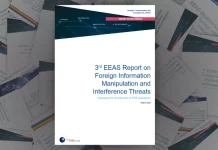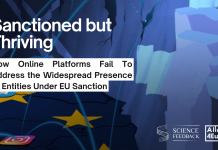By iSans
The iSANS research team has completed its work on a pilot report «Incitement to genocide against Ukrainians in Russian and Belarusian propaganda».
The purpose of the study was to identify statements across the range of anti-Ukrainian rhetoric in Russian and Belarusian propaganda that contain evidence of a crime, as described in paragraph C of Article III of the Convention on the Prevention and Punishment of the Crime of Genocide, namely “direct and public incitement to genocide”.
In preparing for the full-scale invasion of Ukraine, Russian and Belarusian propaganda constantly maintained that there was no Ukraine, that it appeared artificially only thanks to a mistake made by the Soviet authorities, and that “Ukrainians are Russians who have been convinced that they are special Russians.” Propaganda humiliated, mocked and demonized Ukrainians and called Ukraine «anti-Russia». This created a justification for the invasion, legitimizing future atrocities and crimes.
Within the framework of these imperial ideas, the agency of Ukrainians and the independence of their actions are denied as are the very national identity of Ukrainians and their right to self-determination and statehood. The essence of this paradigm is that the Russophobic West is to blame for everything, Ukrainians are part of a single Russian people, there is no independent Ukraine, and this territory can only be under the control of Russia, and if it is «controlled» by the West, it carries an existential threat to Russia, Belarus and their «union state». These conspiracy concepts became the ideological justification for Russia’s full-scale criminal aggression against Ukraine in February 2022 with the complicity of the Lukashenka regime.
The anti-Ukrainian state policy formulated at the highest level and the systematic statements made by state leaders have created fertile ground for the emergence of more radical and aggressive statements in Russia and Belarus. Before the invasion and during the aggression, a massive propaganda machine has fomented hostility towards Ukrainians among millions of Russians, Belarusians, and other audiences numbering in the millions, broadcasting hate speech on television and the internet on a daily basis.
With the outbreak of the war, propaganda quickly shifted to harsher rhetoric. If at the beginning of the aggression, Russian and Belarusian propagandists were still repeating the mantra about the “fraternal people” and “liberation from fascism,” after reports of massacres in Bucha, Irpin, Izyum and other cities, the masks of the “liberators” were finally abandoned, and propaganda media began to call openly for victims among the civilian population and murders of those who resist and does not recognize itself as part of the «Russian world».
Incitement to the extermination of all or part of Ukrainians contain obvious signs of violation of the Genocide Convention. Among the entire array of anti-Ukrainian propaganda statements, quite visibly stand out cases of incitement to the elimination of Ukrainians or part of them which are termed “irredeemable” – those who, according to Russian and Belarusian propaganda, do not want to give up their Ukrainianness and who have not been “cured of the disease of Nazism.” The proportion of the “irredeemable” of the entire population of Ukraine that will need to be eradicated varies according to propagandists, but in any case the discussion is of millions of people.
We have managed to identify and describe the main types of statements – not only the denial of the existence of the state of Ukraine and Ukrainians as a separate national group and statements that cultivate hatred towards and glorify terror against Ukrainians but also statements that represent direct and public incitement to the elimination of Ukrainians that fall under the definition of criminal acts prohibited by the Convention, namely incitement to genocide in the form of complete or partial destruction of the Ukrainian national group.
A separate chapter describes calls for the forced deportation of Ukrainian children to Russia and their illegal adoption, «re-education» and assimilation. According to the Genocide Convention, «forcible transfer of children from one human group to another» is genocide, and direct incitement for such actions is a crime in itself.
We hope that the evidence collected in this report and further research will be entered as evidentiary material in international courts and help bring Russian and Belarusian propaganda figures to justice for their crimes of “incitement to genocide” as part of a broader process of investigating possible international crimes committed by the Putin regime’s during its aggression against Ukraine with the complicity of the Lukashenka regime.
You can read and download the entire report by clicking on the link below.
Материал доступен на русском языке: Призывы к геноциду в отношении украинцев в российской и беларусской пропаганде
By iSans





